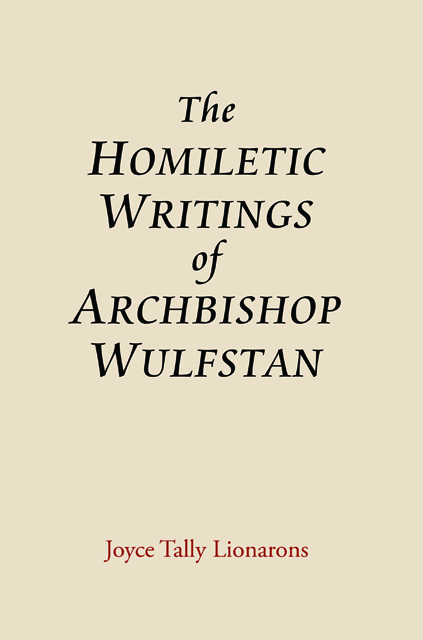Book contents
- Frontmatter
- Contents
- Acknowledgements
- Abbreviations
- Manuscript Sigla
- Introduction
- 1 Wulfstan and Wulfstan Manuscripts
- 2 Re-establishing the Wulfstanian Homiletic Canon
- 3 Wulfstan’s Eschatology
- 4 Salvation History and Christianity
- 5 Wulfstan as Archbishop
- 6 Sacramental Sermons
- 7 The Danish Invasions and the Sermo Lupi ad Anglos
- 8 Homilies Based on Legal Codes and the Institutes of Polity
- Bibliography
- Index
- Miscellaneous Endmatter
- Frontmatter
- Contents
- Acknowledgements
- Abbreviations
- Manuscript Sigla
- Introduction
- 1 Wulfstan and Wulfstan Manuscripts
- 2 Re-establishing the Wulfstanian Homiletic Canon
- 3 Wulfstan’s Eschatology
- 4 Salvation History and Christianity
- 5 Wulfstan as Archbishop
- 6 Sacramental Sermons
- 7 The Danish Invasions and the Sermo Lupi ad Anglos
- 8 Homilies Based on Legal Codes and the Institutes of Polity
- Bibliography
- Index
- Miscellaneous Endmatter
Summary
ALONG with his contemporary and correspondent Ælfric of Eynsham, Archbishop Wulfstan of York (d. 1023) is one of two named writers of vernacular homilies in late Anglo-Saxon England. In comparison to Ælfric, however, Wulfstan has fared relatively poorly at the hands of scholars in the past half-century or so. The standard edition of his works, edited by Dorothy Bethurum in 1957, is outdated and incomplete; Arthur Napier's 1886 edition, on the other hand, contains many homilies that are not Wulfstan's and is lacking its projected companion volume of critical apparatus and commentary. The single book-length study of Wulfstan's homiletic writing, Karl Jost's 1950 Wulfstanstudien, although still invaluable for Jost's exemplary source-study, has in many ways been superseded by later work. After the groundbreaking work of the 1950s, scholarship on Wulfstan's homilies throughout the second half of the twentieth century consisted of numerous, but often widely scattered, articles, along with portions of books otherwise devoted to other topics and writers. Today, however, interest in Wulfstan is at a high not reached since the days of Bethurum, Jost, and Dorothy Whitelock. A volume of proceedings from the Second Alcuin Conference at the University of York, devoted entirely to Wulfstan, appeared in 2002, and a new edition of Wulfstan's homilies is in preparation. Patrick Wormald's monumental The Making of English Law has set a standard for scholarship that few can hope to equal, but by its nature his study deals with the homilies only where they intersect with the laws. A critical study of the homilies is long overdue.
This book provides such a study, focusing on three aspects of Wulfstan's work: 1. extant Wulfstan manuscripts and the re-establishment of the Wulfstan homiletic canon; 2. Wulfstan's processes of composition and revision as manifested in manuscript variants of the homilies; and 3. Wulfstan's characteristic themes and concerns, which include eschatology, the education and behavior of both clergy and laity, penance, baptism, and the relationship between church and state.
Chapter 1 examines the manuscripts associated with Wulfstan either through his own handwriting or through their contents: these include not only the homiletic manuscripts per se, but also those manuscripts containing Wulfstan's legal writings and the Institutes of Polity, along with the so-called ‘commonplace book’ manuscripts that contain many of his source materials.
- Type
- Chapter
- Information
- The Homiletic Writings of Archbishop WulfstanA Critical Study, pp. 1 - 8Publisher: Boydell & BrewerPrint publication year: 2010

